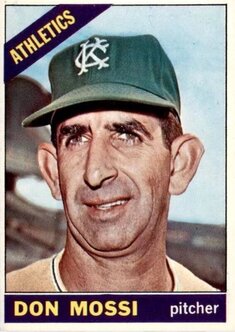
Mossi, who died July 19 at age 90 in Nampa, Idaho, was a fine left-handed pitcher for 12 seasons. He played for the Cleveland Indians, Detroit Tigers, Chicago White Sox and the Athletics from 1954 to 1965. He was known as “The Sphinx” or simply “Ears.” He had prominent ears and a large nose (hey, I’m of Italian descent, so I can sympathize with the nose), and although he ran a hotel later in life after baseball, his dark complexion and five o’clock shadow made him look like your town’s friendly undertaker.
Jim Bouton, writing in Ball Four, noted that Mossi “looked like a cab going down the street with its doors open.” More charitably, Brendan C. Boyd and Fred C. Harris, in their book, The Great American Baseball Card Flipping, Trading and Bubble Gum Book, described Mossi as having “loving cup ears.”
But forget the ears — Mossi was all heart, as a player and as a man.
He had a 101-80 record with a 3.43 ERA and saved 50 games. He made 165 career starts and had 55 complete games, and only made three errors.
During his rookie season in 1954, Mossi teamed with Ray Narleski to give the Indians a lefty-righty one-two punch out of the bullpen. It would have been hard for Mossi to crack the Indians’ starting rotation in 1954 since it contained future Hall of Famers Early Wynn, Bob Lemon and Bob Feller.
Nevertheless, Mossi went 6-1 with a 1.94 ERA and seven saves. He also made three appearances in the 1954 World Series and did not allow a run.
Mossi never had a great fastball, but he got by with guile and pinpoint control. He was traded to Detroit, along with Narleski, for Billy Martin, in November 1958. Mossi blossomed as a starter in Detroit, going 17-9 in 1959 and 15-7 in 1961. He had 15 complete games in 1959 and 12 in 1961.
On April 11, 1963. Mossi flirted with a perfect game, retiring the first 19 Cleveland Indians he faced before Tony Martinez had an infield hit. Gene Green was the only other Cleveland batter to get a hit, singling in the ninth. Mossi won, 6-1. Lou Mio of the News-Herald in Mansfield, Ohio, wrote that Mossi summoned “his four evangelists — Fast, Change, Slider and Curve”— to dispatch the Indians in 2 hours, 22 minutes.
Some players get a dinner held in their honor after retirement. For more than 40 years, Mossi has been celebrated annually on his birthday.
In January 1974, Doug Bureman, an assistant in the Cincinnati Reds’ public relations department, was sitting in his apartment with some friends, looking through baseball cards and drinking beer.
“We wanted to have a party but we needed an excuse to have one,” Bureman told Bob Hertzel of the Cincinnati Enquirer in 1977.
Bureman happened to see Mossi’s card and flipped to the back. He saw that Mossi’s birthdate was Jan. 11, 1929. Bingo. The first annual Don Mossi Birthday Party was born. More than 80 people, paying a dime apiece, showed up for the party. Some of Bureman’s friends baked a birthday cake “that looked just like Don,” and the group made a telephone call to the bemused Mossi at his California home.
The second annual party was even bigger. Among the 280 guests attending the party at the Disabled American Veterans hall in Clifton, Ohio, were Reds catcher Johnny Bench and Cincinnati broadcaster Marty Brennaman. Entertainment was provided by the aptly named Don Mossi Blues Band.
Mickey Mantle didn’t get this kind of love.
At Jefferson High School in Daly City, California, Mossi not only was a baseball star, but also a quarterback for the Indians (a nice coincidence with the team nickname). Described as “a triple threat,” Mossi was named a first-team quarterback to the Peninsula Athletic League in 1946 and 1947. He also kicked extra-point attempts.
Mossi was signed by Cleveland and worked his way up the minor league chain, starting with Class C Bakersfield of the California League in 1949. He advanced to Class A ball, and by 1953 was in Double-A with Dallas and Tulsa in the Texas League before breaking into the majors in 1954.
His biggest moment in the minor leagues came on Aug. 27, 1950, in Bakersfield, when Mossi married Eunice Bedford at home plate before the Indians’ game against the San Jose Red Sox. Mossi then pitched no-hit ball for 7 2/3 innings in the Indians’ 13-1 victory. He allowed a home run to Sheriff Robinson in the eighth inning but finished with a two-hit victory.
Don and Eunice were married for nearly 45 years. Eunice died in June 1995. She was 62.
I belong to several online baseball card trading groups. Several years ago, in one of my groups, we had an online discussion about homely looking pictures of players on baseball cards, and Mossi’s name invariably came up.
Shortly after that, we received an angry (and profane) letter from one of Mossi’s granddaughters, who admonished us for our lack of sensitivity. If she had seen a photo of us card collectors, she would have realized that we were a homely looking bunch. Kindred spirits, if you will. But we all got her point.
After Eunice’s death, Mossi moved to Idaho in 2000 to be closer to his large family. According to his obituary in the Idaho Statesman, Mossi remained busy in his final years by hunting, camping, woodwork and gardening. Above all, he was a family man, cherished by his three children, 12 grandchildren and 25 great-grandchildren.
I still have that 1966 Don Mossi card from Topps — actually, two of them. One of them has his autograph on it. It remains one of my favorite cards, but now, for a different reason.
Mossi deserved a loving cup — not for his ears, but for his heart and the life he led.
 RSS Feed
RSS Feed
